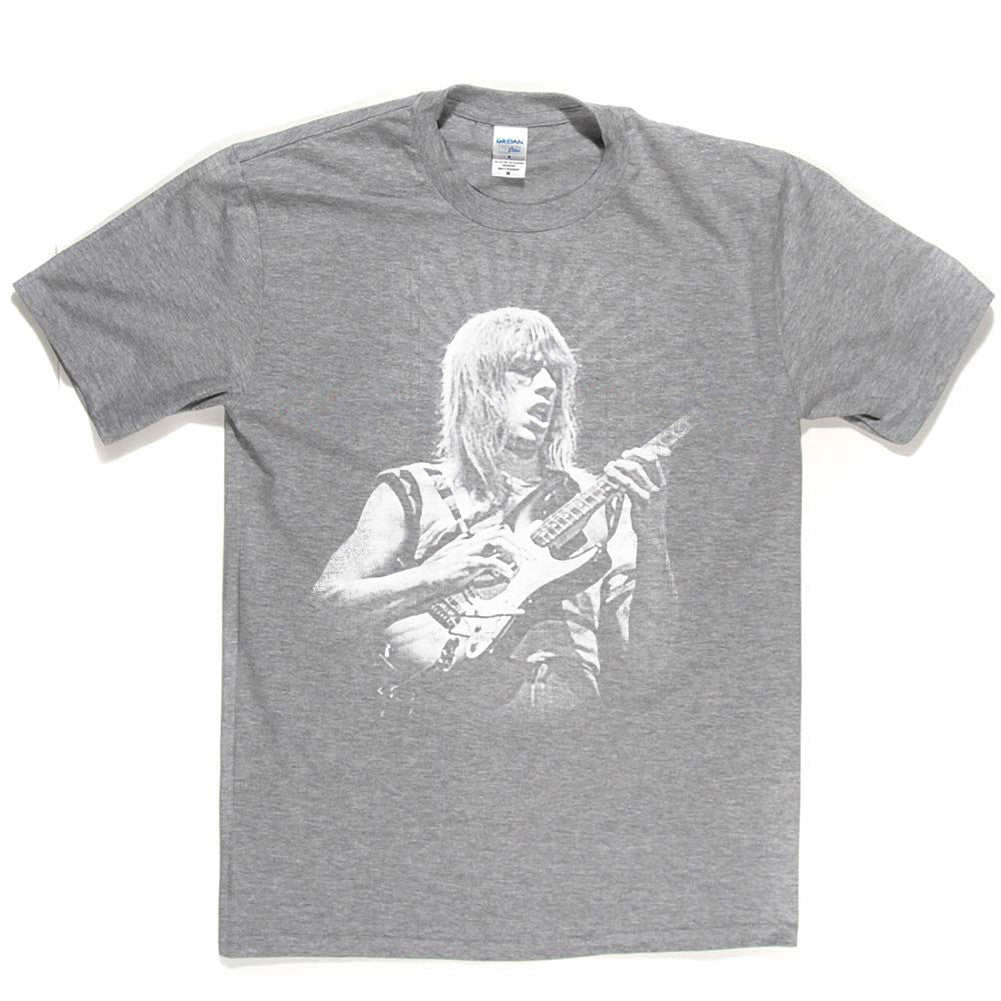Steve Howe T Shirt
About the Product
In April 1970, the rock band Yes sought a new guitarist following the departure of Peter Banks. During early plans for Howe to potentially join Yes, he was invited to a try out session with the band in Fulham, which was a success and landed him the position in June. As Banks had left the band before their second album Time and a Word was set for release outside Europe, Howe was photographed with the group on its cover despite not playing on it. After several gigs with Howe, the band retreated to a farmhouse in Devon to rehearse and write new material for the band's third album, The Yes Album (1971). Howe's electric and acoustic guitars, combined with Jon Anderson's vocals, Chris Squire's bass, Bill Bruford's drums, and Tony Kaye's keyboards, were seen as an essential part of the band's change in musical direction towards progressive and art rock. The album includes a live recording of Howe's solo guitar piece "Clap", recorded on 17 July at the Lyceum Theatre in London. It was a commercial breakthrough for the group. Kaye left in 1971 and was replaced by Rick Wakeman for the following album, Fragile. This classic Yes line-up of Anderson–Howe–Squire–Bruford–Wakeman is associated with the peak of the band's early achievements. Fragile is one of the most successful Yes works, a milestone album which raised their stature as one of the most prominent progressive rock groups of the time. In the spring of 1971, both Wakeman and Howe had contributed to the recording of Lou Reed's first solo album as session musicians, working together for the first time on this occasion. To his already-formidable assortment of electric and acoustic guitar sounds, Howe added a unique approach to pedal steel guitar in the next album, Close to the Edge, released in 1972. His classical training along with his penchant for ongoing experimentation, helped produce a playing style unique among rock musicians, while the group as a whole took a position as a leading progressive rock band Following Close to the Edge, Howe played on Tales from Topographic Oceans, Relayer, Going for the One and Tormato, becoming one of the most successful bands of the decade. Two of these five albums achieved platinum certification in the US, and the other three were certified gold. In 1975, Yes took an extended break for each member to release a solo album. Howe recorded a mixture of solo and group performed tracks for Beginnings at Morgan and Advision Studios with producer Eddie Offord, with performances from Bruford, Alan White, Patrick Moraz, and singer Claire Hamill. The album was released in October 1975 by Atlantic Records and reached No. 22 in the UK and No. 63 in the US. His second solo album, The Steve Howe Album, was released in November 1979. In early 1980, Anderson and Wakeman left the group and were replaced a few weeks later by Trevor Horn and Geoff Downes. 1980's Drama, saw a stylistic change for Yes, incorporating elements of new wave into their progressive rock blend. Howe continued with the band until Yes officially split up in early 1981. Although the group was back together less than a year later, Howe was not included in the new line-up.
Couldn't load pickup availability
EU Countries: You've heard of Brexit haven't you? If you haven't, I admire your ability to ignore the real world. It means if you live in the EU, you will have to pay VAT on your order to get it delivered. Please don't waste all of our time by ordering if you aren't prepared to pay it and don't send me indignant emails about it - I can't help it, I hate it more than you, believe me and I have told you!! Right?
View Product Details





